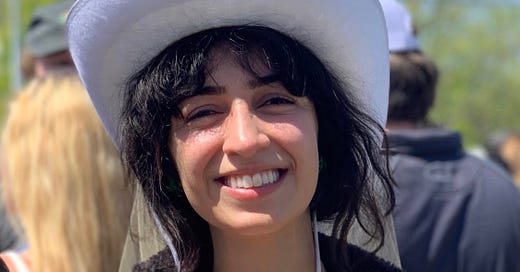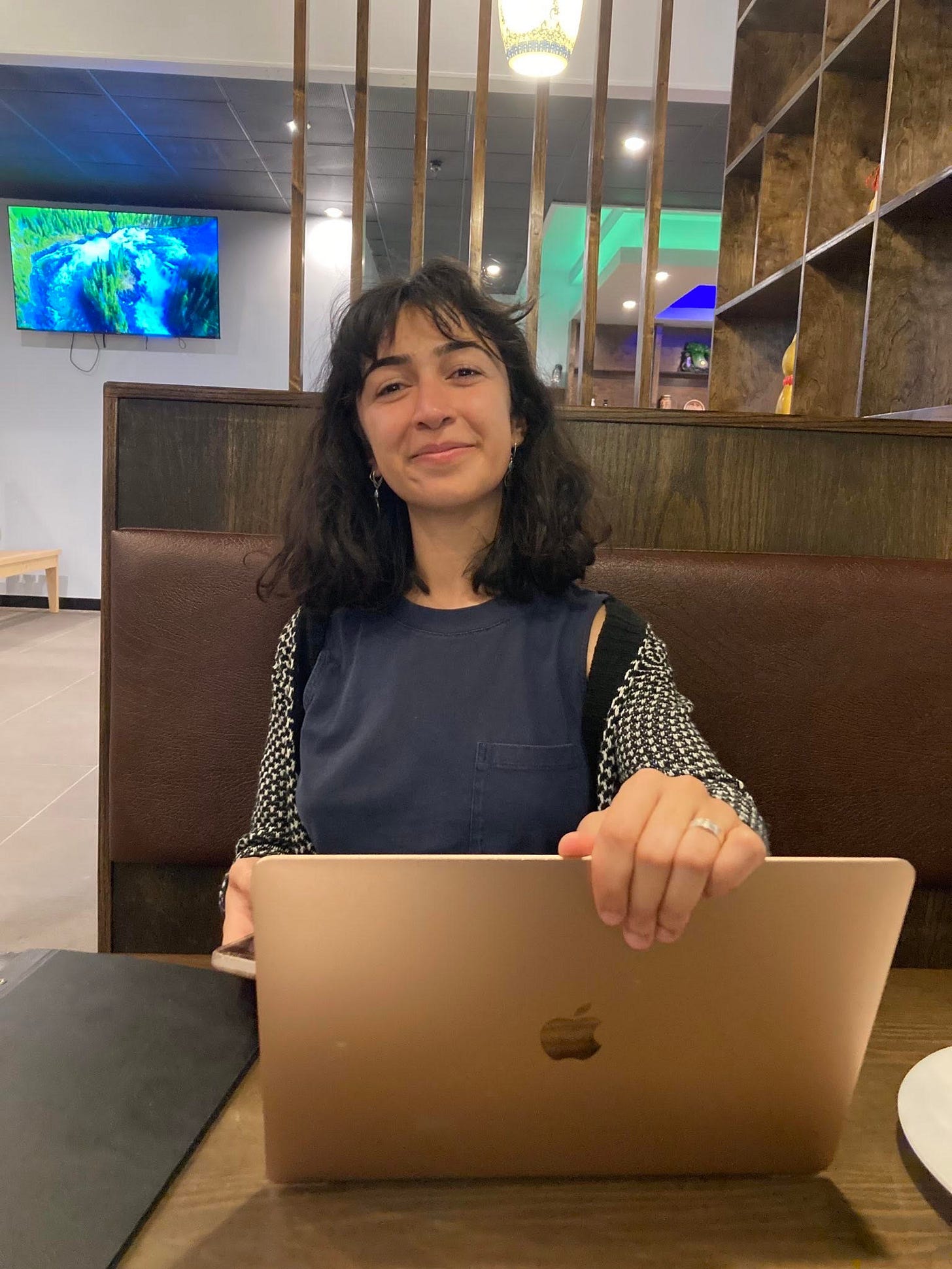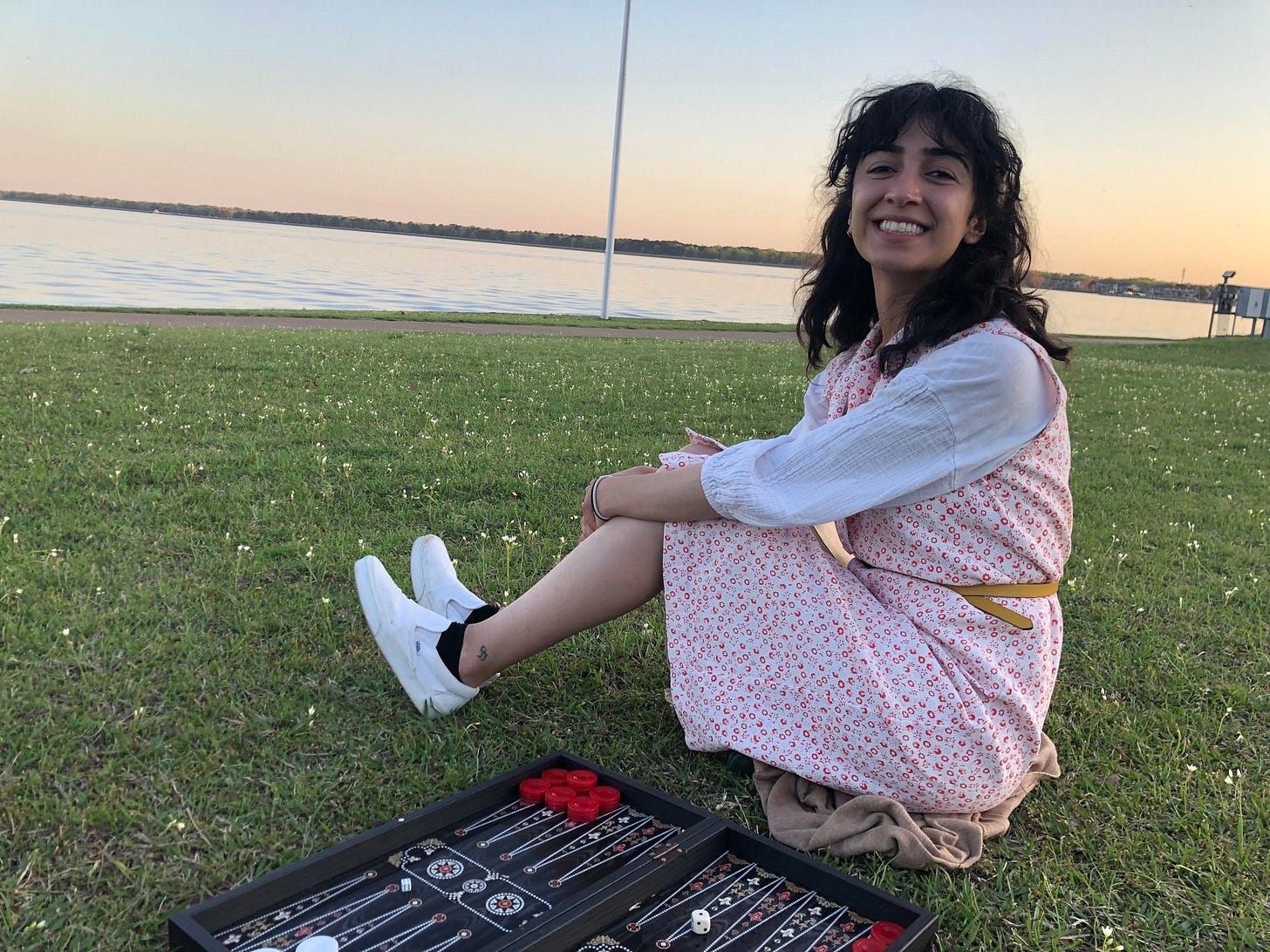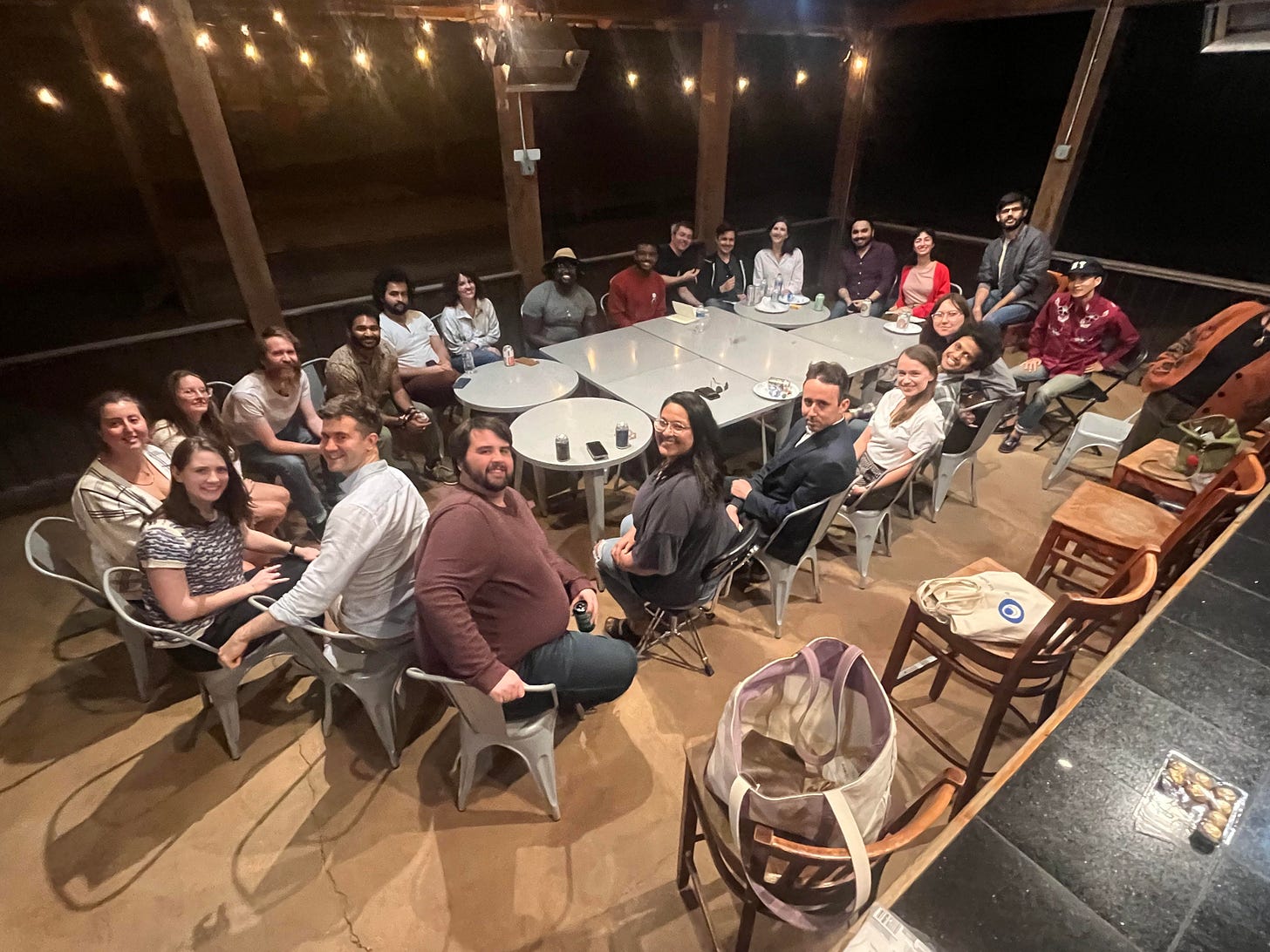Rooted Re-Run: Delana Karimi-Tavakol
"Home is where I can be authentically and unapologetically myself. Mississippi taught me that."
This is the last in a series of encore issues from the Rooted archive while I’ve been out and about promoting Split the Baby. We’ll be back next week with brand new interviews! When Delana Karimi-Tavakol moved to Jackson after finishing law school in Quebec, many Mississippians had the same question for her: How long are you staying? “The revolving door of transplants like me is so familiar, an expiration date is all anyone could expect,” she writes. Now five years in, she’s not planning on going anywhere: “Jackson, specifically, has given me community, security, dignity, desire. If anyone needs me to stay, it’s me.“ Read more about how Delana has fostered a community that keeps her rooted in Mississippi’s capital city.
Where are you from?
I was born in Los Angeles, and my heritage is Iranian. When someone asks where I’m from, they’re usually searching for one of those two answers. Though I’ve never been satisfied by either. I moved from Los Angeles to Chicago when I was a teenager. From there, to Montreal, where I lived before coming here. I’ve lived in different parts of the country and world, and nourish deep connections to several cultures. I’m all of my “from”s, and I brought them all with me to Mississippi.
When did you move to Mississippi and why did you move here?
I moved to Mississippi in August 2020. I was entering my last summer of law school in Quebec, and I needed to decide which side of the U.S.-Canada border to lock down in. I had an internship with the ACLU of Mississippi in Jackson, and I let that factor make the decision for me.
I’ve lived in different parts of the country and world, and nourish deep connections to several cultures. I’m all of my “from”s, and I brought them all with me to Mississippi.
What does “home” mean to you? How does Mississippi fit into that definition?
Home is where I can be authentically and unapologetically myself. Mississippi taught me that. Jackson, specifically, is the first place I’ve felt free to exist without pretense. As a city, it’s real and honest, and it expects as much from the people who live in it. I’m encouraged to be myself, and I feel held and loved as I am. That’s freedom, and that’s home.
What do you miss most about the place where you’re from?
The food, and the abundantly diverse environments in which to eat it. Pick any cuisine in the world, and I’m sure you could find it prepared authentically and creatively in Los Angeles. Montreal, too, has multiple Persian cafes, each with a different aesthetic and culinary approach. There are many places I love to eat in Jackson, but non-American cuisines are often pigeonholed into offering a certain type of selection and experience that can leave me wanting more.
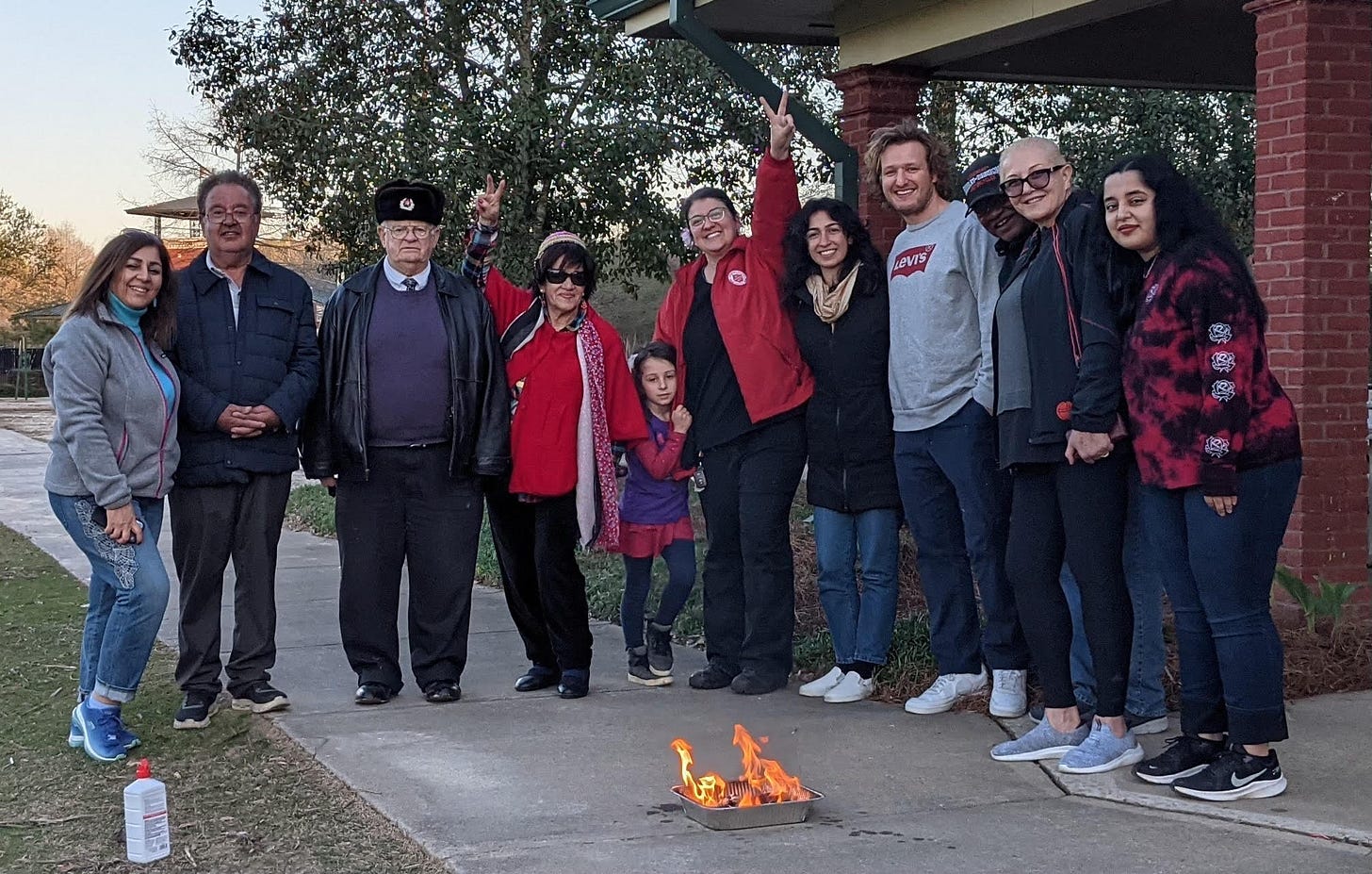
How have you cultivated community in Mississippi? Who are the people who have made you feel rooted here?
My rootedness in Mississippi is fibrous. Unlike tap roots, which are singular and deep, fibrous roots are abundant and wide-reaching. I have deep friendships in Mississippi and I have deep friendships outside of Mississippi. Past a certain threshold of intimacy, relationships transcend place in that way. So for my roots in Mississippi, it’s the fibrous ones that hold me down.
These roots are the personalities I encounter in my everyday. The baristas at Urban Foxes, the staff at Mr. Chen’s, the tree I sit next to on the Chisha Foka Multi-Use Trail, the squirrels outside my window every morning. The ones who’ve seen me at my sloppiest, most mundane, and most real. Over time and repetition I’ve cultivated these roots–plenty, patinaed, and essential.
As a transplant, I’m biased. But I think fresh perspectives can sometimes offer clarity in Mississippi, a place so weighted by lore and baggage, on what it is and what it deserves to be.
What’s the weirdest question or assumption you’ve encountered about Mississippi (or about you as a Mississippian) by someone who’s never been here?
The 2020 election happened a few months after I moved here. I was on the phone with my family, explaining the push in Mississippi to increase voter registration amongst people of color. I remember my aunt’s confusion. She thought that Mississippi, as the state with the highest African American/Black population in the country, would already be represented by mostly people of color. Coming from Iran, she hadn’t been exposed to Mississippi’s reputation as a white, conservative state (even as the white, conservative state). She saw it with clear eyes.
As a transplant, I’m biased. But I think fresh perspectives can sometimes offer clarity in Mississippi, a place so weighted by lore and baggage, on what it is and what it deserves to be. My aunt’s assumption wasn’t weird, it was logical and right. Mississippi should be led by people who represent its population. What’s weird is that it’s not.
How has living in Mississippi affected your identity and your life’s path?
Before moving to Jackson, I spent a lot of time dreaming about my next adventure. I got bored quickly so thought my life had to be transient, hasty, and essentially unrooted. But after four years in Mississippi, I’ve still never been bored. There’s enough in Jackson to make real choices (about where to drink, who to hang out with, what to do, etc.), but not so many that I get overstimulated, desensitized, and inevitably dissatisfied. I’ve learned the blessing of reasonable limitations.
Thanks to Mississippi, I’m curious about what I’d otherwise overlook, I discover quirks to appreciate the imperfect, and I enjoy the peace that comes with accepting what’s in front of me. My energy for change isn’t muted, it’s just redirected. Jackson showed me that so much is possible when we adjust our attention to a manageable scale. For me, that means sitting with this place, with its gifts and discomforts, and moving in harmony with it.
Mississippi is what you make of it. I sincerely believe its possibilities are endless.
What is something that you’ve learned about Mississippi only by living here? In what ways has Mississippi lived up to your expectations?
Mississippi is so much more than I could have imagined before living here. It’s the dandelions that grow through cracks in our roads–impossibly resilient, slightly toxic, a bit bitter, and one of the most nourishing things you could find. It’s a treasure hunt, where you can be in “the middle of nowhere” and, through dense forest or across vast farmland, you suddenly encounter a five-star restaurant, an international festival, a monastery founded by Thích Nhất Hạnh (all real things in “middle of nowhere” Mississippi–go look for them!).
I read this passage from Okakura Kakuzo’s The Book of Tea, and it reminded me of Mississippi: “True beauty could be discovered only by one who mentally completed the incomplete. The virility of life and art lay in its possibilities for growth. In the tea-room it is left for each guest in imagination to complete the total effect in relation to himself” (70).
Mississippi is what you make of it. I sincerely believe its possibilities are endless.
Have you ever thought about moving away? Does a sense of duty keep you rooted here? Do you have a “tipping point”?
When I moved to Mississippi, the first question everyone asked was how long I planned to stay. The revolving door of transplants like me is so familiar, an expiration date is all anyone could expect. I felt defiant, and very early in my time here I decided I’d never leave. That determination got me through years at toxic workplaces and personal challenges that I decided were less important than the impetus to stay. Chronically ill, habitually stressed, and unrecognizable to myself, I finally burned out, and took up a new approach.
Mississippi deserves the possibilities that come only with a population that stays. But there’s arrogance in thinking that Mississippi, one of the most resilient places in the world, needs me. Jackson, specifically, has given me community, security, dignity, desire. If anyone needs me to stay, it’s me.
There are real challenges to life here. But, for me, the pain of Mississippi doesn’t come close to its pleasure. I’ll live here for as long as that’s true.
What do you wish the rest of the country understood about Mississippi?
There isn’t a single issue in Mississippi, or the South for that matter, that doesn’t exist everywhere else in this messy country. We just lack the pacifier of half-assed reforms to soften the blow.
Is there a Mississippi change-maker who you think everyone needs to know about?
There are so many nameable greats in Mississippi, it feels impossible to choose just one. Instead, I encourage folks to find out where and when their closest farmer’s market is, go to it, and chat up any of the vendors. I guarantee you’ll learn something new and exciting about Mississippi.
There isn’t a single issue in Mississippi, or the South for that matter, that doesn’t exist everywhere else in this messy country. We just lack the pacifier of half-assed reforms to soften the blow.
If you had one billion dollars to invest in Mississippi, how would you spend your money?
Mobility! For Jackson, to start, with the hope that these investments would spread across the state.
At the pedestrian level, I’d invest in continuous, energy-generating sidewalks for walking and rolling. They’d be heavily shaded with native fruit trees, and well lit at night.
For our roads, I’d repurpose excessive lanes and medians into spacious, painted, and (again) shaded paths for cycling and running. I’d create affordable, accessible, and efficient train systems to compete with the false efficiency of car travel.
I’d increase the direct flights to and from the airport. Mississippi deserves the world, and the world could use some Mississippi, too.
I’d also create residencies for global experts in feminist urban design to teach in our schools and launch a new generation of planners to design our state towards freedom.
That is all.
What or who do you want to shamelessly promote? (It can absolutely be a project you’re working on, or something you are involved in.)
Every month for the past three and a half years, my friend Josh Tom and I have organized a space we call The Southern Salon. The Salon is a self-moderated group discussion, free and open to the public. Josh or I will prepare a topic if necessary to keep the monthly cadence, but anyone is welcome to pitch an idea and facilitate its discussion. About ten to fifteen people show up each time, always slightly different in size and makeup depending on the subject that month. Past topics include monogamy, taxation, lost arts, hierarchy, and so much more.
Fondren Guitars has an amazing patio and bar they let us use for these gatherings. We meet at 5:30 p.m. on the second Wednesday of every month. If you’d like to attend or join our email list, you can reach out to me at dtavakol@protonmail.ch.


